US History and Constitution Assignment: Constitutional Law Analysis
VerifiedAdded on 2022/11/10
|8
|1819
|200
Homework Assignment
AI Summary
This assignment delves into the intricacies of the US Constitution, examining core concepts and their implications. It begins by defining essential terms such as the Bill of Rights, Commerce Clause, Due Process, and Federalism, providing concise explanations for each. The assignment then explores the separation of powers among the legislative, executive, and judicial branches, clarifying their respective roles and responsibilities. Furthermore, it addresses the powers of the federal government, particularly those related to the Commerce Clause and implied powers, and examines the limitations imposed on states. The assignment also analyzes the Fourteenth Amendment, discussing its impact on citizenship, due process, and equal protection. Finally, it contrasts substantive and procedural due process and explores the levels of scrutiny used by courts in cases involving discrimination based on gender, race, and age, as well as the consequences of police misconduct. The assignment incorporates relevant legal doctrines and constitutional provisions to provide a comprehensive understanding of the subject matter.
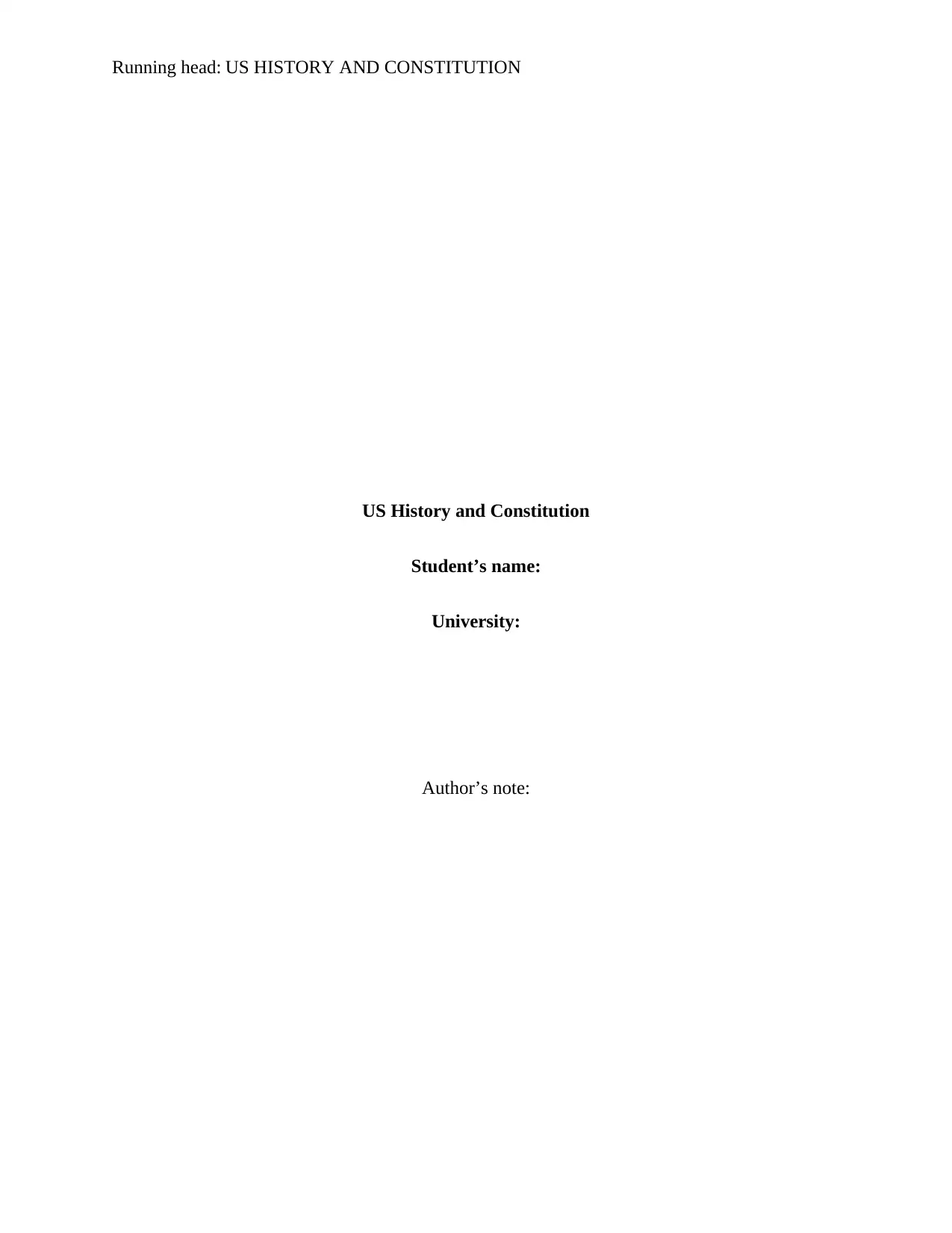
Running head: US HISTORY AND CONSTITUTION
US History and Constitution
Student’s name:
University:
Author’s note:
US History and Constitution
Student’s name:
University:
Author’s note:
Paraphrase This Document
Need a fresh take? Get an instant paraphrase of this document with our AI Paraphraser
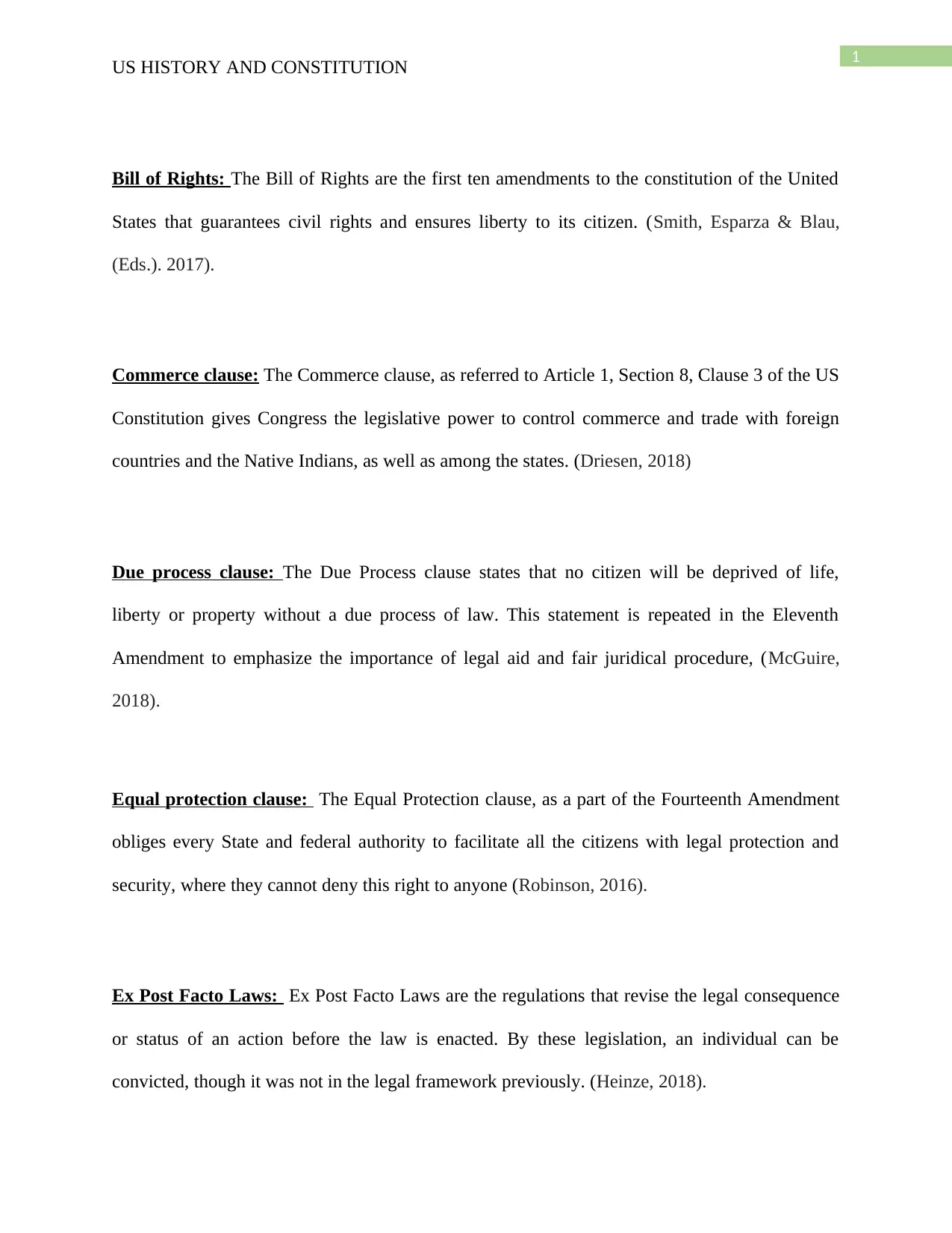
1
US HISTORY AND CONSTITUTION
Bill of Rights: The Bill of Rights are the first ten amendments to the constitution of the United
States that guarantees civil rights and ensures liberty to its citizen. (Smith, Esparza & Blau,
(Eds.). 2017).
Commerce clause: The Commerce clause, as referred to Article 1, Section 8, Clause 3 of the US
Constitution gives Congress the legislative power to control commerce and trade with foreign
countries and the Native Indians, as well as among the states. (Driesen, 2018)
Due process clause: The Due Process clause states that no citizen will be deprived of life,
liberty or property without a due process of law. This statement is repeated in the Eleventh
Amendment to emphasize the importance of legal aid and fair juridical procedure, (McGuire,
2018).
Equal protection clause: The Equal Protection clause, as a part of the Fourteenth Amendment
obliges every State and federal authority to facilitate all the citizens with legal protection and
security, where they cannot deny this right to anyone (Robinson, 2016).
Ex Post Facto Laws: Ex Post Facto Laws are the regulations that revise the legal consequence
or status of an action before the law is enacted. By these legislation, an individual can be
convicted, though it was not in the legal framework previously. (Heinze, 2018).
US HISTORY AND CONSTITUTION
Bill of Rights: The Bill of Rights are the first ten amendments to the constitution of the United
States that guarantees civil rights and ensures liberty to its citizen. (Smith, Esparza & Blau,
(Eds.). 2017).
Commerce clause: The Commerce clause, as referred to Article 1, Section 8, Clause 3 of the US
Constitution gives Congress the legislative power to control commerce and trade with foreign
countries and the Native Indians, as well as among the states. (Driesen, 2018)
Due process clause: The Due Process clause states that no citizen will be deprived of life,
liberty or property without a due process of law. This statement is repeated in the Eleventh
Amendment to emphasize the importance of legal aid and fair juridical procedure, (McGuire,
2018).
Equal protection clause: The Equal Protection clause, as a part of the Fourteenth Amendment
obliges every State and federal authority to facilitate all the citizens with legal protection and
security, where they cannot deny this right to anyone (Robinson, 2016).
Ex Post Facto Laws: Ex Post Facto Laws are the regulations that revise the legal consequence
or status of an action before the law is enacted. By these legislation, an individual can be
convicted, though it was not in the legal framework previously. (Heinze, 2018).
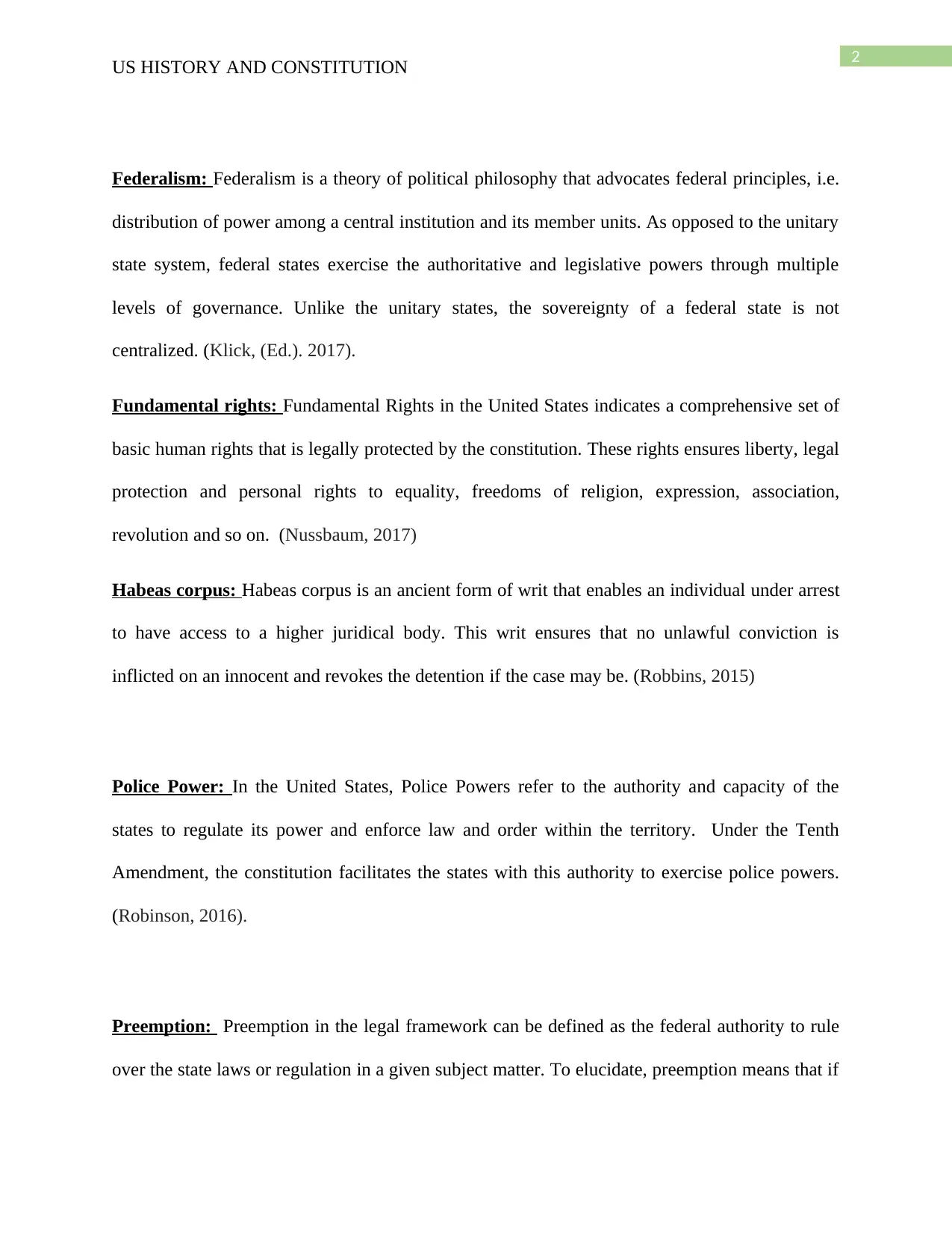
2
US HISTORY AND CONSTITUTION
Federalism: Federalism is a theory of political philosophy that advocates federal principles, i.e.
distribution of power among a central institution and its member units. As opposed to the unitary
state system, federal states exercise the authoritative and legislative powers through multiple
levels of governance. Unlike the unitary states, the sovereignty of a federal state is not
centralized. (Klick, (Ed.). 2017).
Fundamental rights: Fundamental Rights in the United States indicates a comprehensive set of
basic human rights that is legally protected by the constitution. These rights ensures liberty, legal
protection and personal rights to equality, freedoms of religion, expression, association,
revolution and so on. (Nussbaum, 2017)
Habeas corpus: Habeas corpus is an ancient form of writ that enables an individual under arrest
to have access to a higher juridical body. This writ ensures that no unlawful conviction is
inflicted on an innocent and revokes the detention if the case may be. (Robbins, 2015)
Police Power: In the United States, Police Powers refer to the authority and capacity of the
states to regulate its power and enforce law and order within the territory. Under the Tenth
Amendment, the constitution facilitates the states with this authority to exercise police powers.
(Robinson, 2016).
Preemption: Preemption in the legal framework can be defined as the federal authority to rule
over the state laws or regulation in a given subject matter. To elucidate, preemption means that if
US HISTORY AND CONSTITUTION
Federalism: Federalism is a theory of political philosophy that advocates federal principles, i.e.
distribution of power among a central institution and its member units. As opposed to the unitary
state system, federal states exercise the authoritative and legislative powers through multiple
levels of governance. Unlike the unitary states, the sovereignty of a federal state is not
centralized. (Klick, (Ed.). 2017).
Fundamental rights: Fundamental Rights in the United States indicates a comprehensive set of
basic human rights that is legally protected by the constitution. These rights ensures liberty, legal
protection and personal rights to equality, freedoms of religion, expression, association,
revolution and so on. (Nussbaum, 2017)
Habeas corpus: Habeas corpus is an ancient form of writ that enables an individual under arrest
to have access to a higher juridical body. This writ ensures that no unlawful conviction is
inflicted on an innocent and revokes the detention if the case may be. (Robbins, 2015)
Police Power: In the United States, Police Powers refer to the authority and capacity of the
states to regulate its power and enforce law and order within the territory. Under the Tenth
Amendment, the constitution facilitates the states with this authority to exercise police powers.
(Robinson, 2016).
Preemption: Preemption in the legal framework can be defined as the federal authority to rule
over the state laws or regulation in a given subject matter. To elucidate, preemption means that if
⊘ This is a preview!⊘
Do you want full access?
Subscribe today to unlock all pages.

Trusted by 1+ million students worldwide
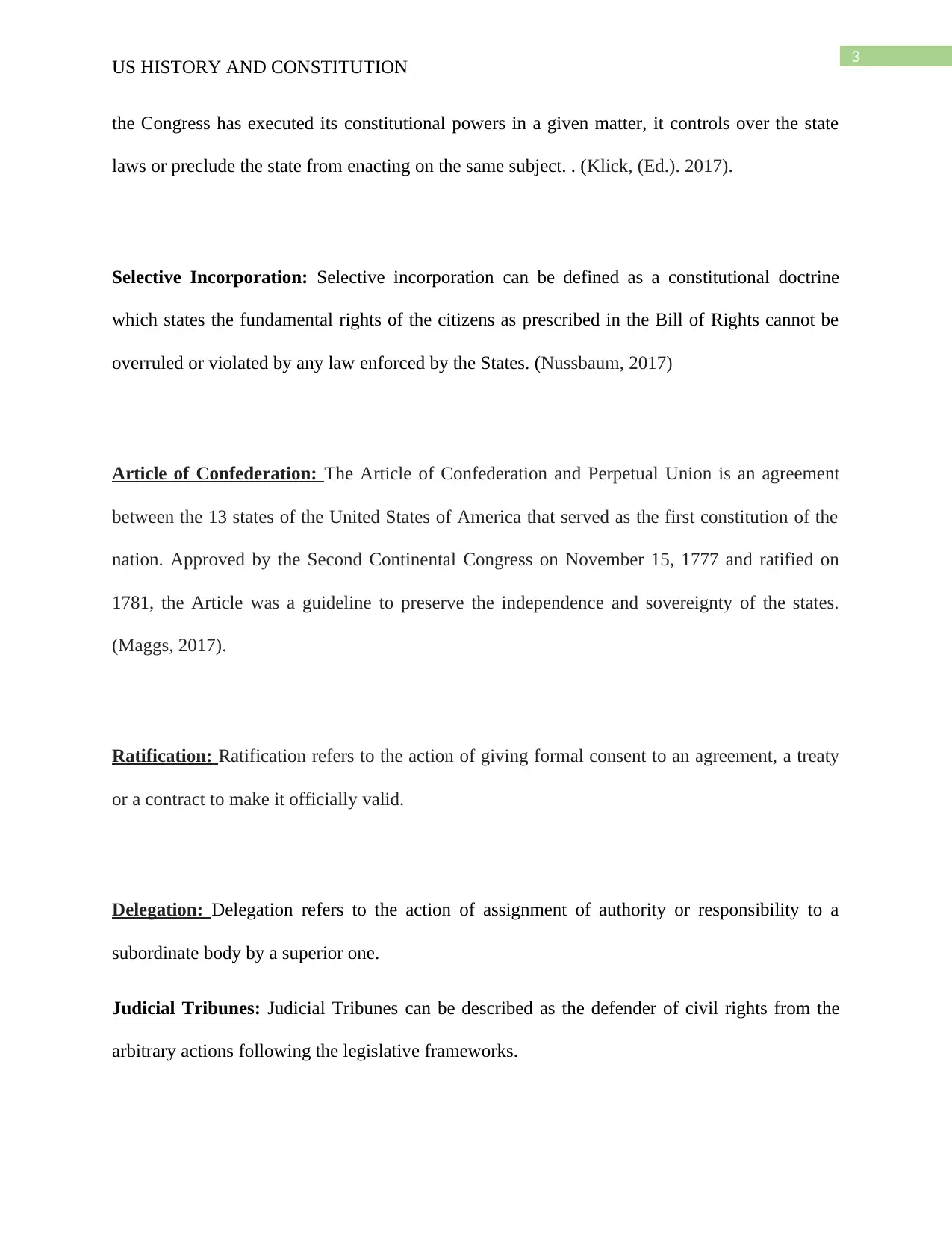
3
US HISTORY AND CONSTITUTION
the Congress has executed its constitutional powers in a given matter, it controls over the state
laws or preclude the state from enacting on the same subject. . (Klick, (Ed.). 2017).
Selective Incorporation: Selective incorporation can be defined as a constitutional doctrine
which states the fundamental rights of the citizens as prescribed in the Bill of Rights cannot be
overruled or violated by any law enforced by the States. (Nussbaum, 2017)
Article of Confederation: The Article of Confederation and Perpetual Union is an agreement
between the 13 states of the United States of America that served as the first constitution of the
nation. Approved by the Second Continental Congress on November 15, 1777 and ratified on
1781, the Article was a guideline to preserve the independence and sovereignty of the states.
(Maggs, 2017).
Ratification: Ratification refers to the action of giving formal consent to an agreement, a treaty
or a contract to make it officially valid.
Delegation: Delegation refers to the action of assignment of authority or responsibility to a
subordinate body by a superior one.
Judicial Tribunes: Judicial Tribunes can be described as the defender of civil rights from the
arbitrary actions following the legislative frameworks.
US HISTORY AND CONSTITUTION
the Congress has executed its constitutional powers in a given matter, it controls over the state
laws or preclude the state from enacting on the same subject. . (Klick, (Ed.). 2017).
Selective Incorporation: Selective incorporation can be defined as a constitutional doctrine
which states the fundamental rights of the citizens as prescribed in the Bill of Rights cannot be
overruled or violated by any law enforced by the States. (Nussbaum, 2017)
Article of Confederation: The Article of Confederation and Perpetual Union is an agreement
between the 13 states of the United States of America that served as the first constitution of the
nation. Approved by the Second Continental Congress on November 15, 1777 and ratified on
1781, the Article was a guideline to preserve the independence and sovereignty of the states.
(Maggs, 2017).
Ratification: Ratification refers to the action of giving formal consent to an agreement, a treaty
or a contract to make it officially valid.
Delegation: Delegation refers to the action of assignment of authority or responsibility to a
subordinate body by a superior one.
Judicial Tribunes: Judicial Tribunes can be described as the defender of civil rights from the
arbitrary actions following the legislative frameworks.
Paraphrase This Document
Need a fresh take? Get an instant paraphrase of this document with our AI Paraphraser
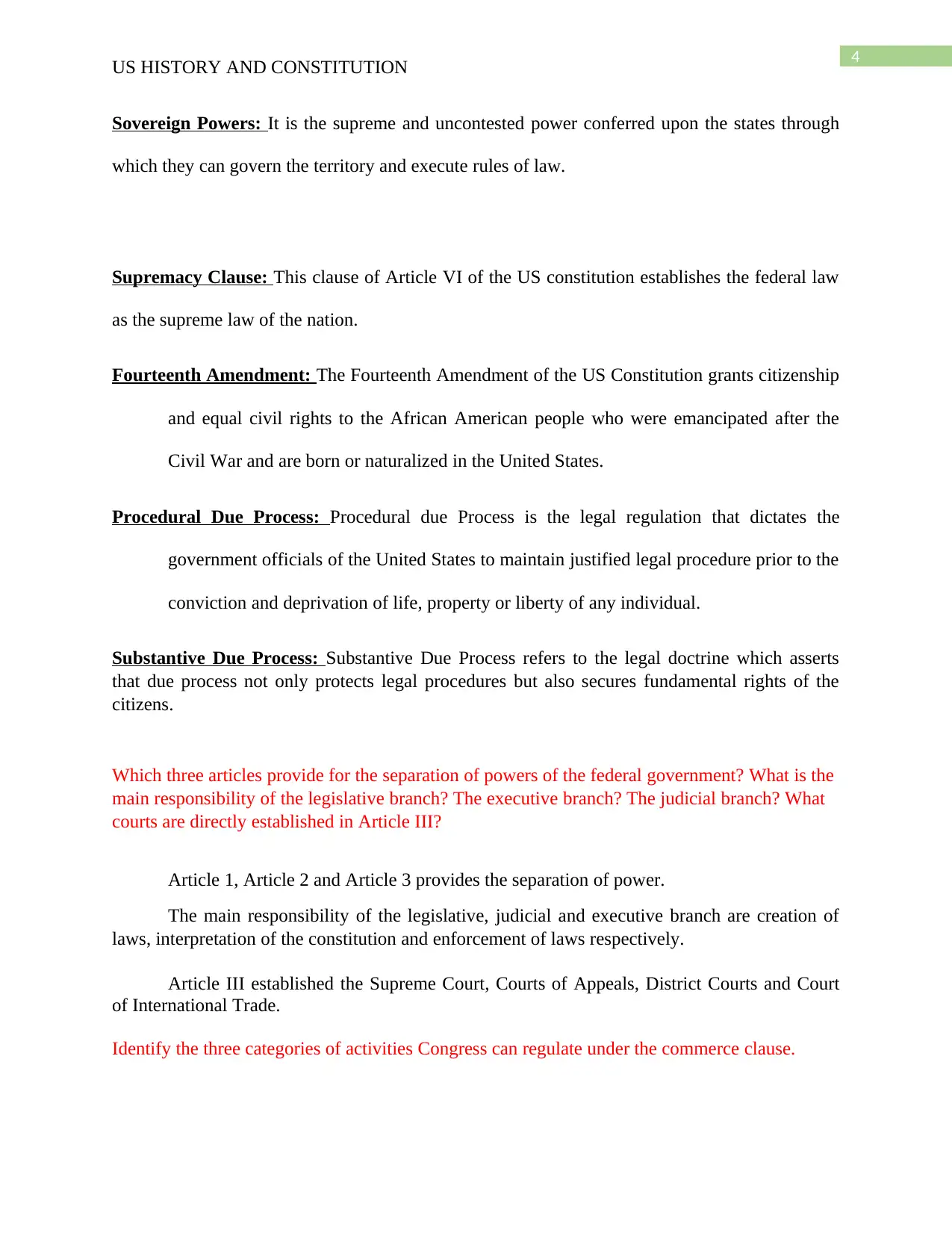
4
US HISTORY AND CONSTITUTION
Sovereign Powers: It is the supreme and uncontested power conferred upon the states through
which they can govern the territory and execute rules of law.
Supremacy Clause: This clause of Article VI of the US constitution establishes the federal law
as the supreme law of the nation.
Fourteenth Amendment: The Fourteenth Amendment of the US Constitution grants citizenship
and equal civil rights to the African American people who were emancipated after the
Civil War and are born or naturalized in the United States.
Procedural Due Process: Procedural due Process is the legal regulation that dictates the
government officials of the United States to maintain justified legal procedure prior to the
conviction and deprivation of life, property or liberty of any individual.
Substantive Due Process: Substantive Due Process refers to the legal doctrine which asserts
that due process not only protects legal procedures but also secures fundamental rights of the
citizens.
Which three articles provide for the separation of powers of the federal government? What is the
main responsibility of the legislative branch? The executive branch? The judicial branch? What
courts are directly established in Article III?
Article 1, Article 2 and Article 3 provides the separation of power.
The main responsibility of the legislative, judicial and executive branch are creation of
laws, interpretation of the constitution and enforcement of laws respectively.
Article III established the Supreme Court, Courts of Appeals, District Courts and Court
of International Trade.
Identify the three categories of activities Congress can regulate under the commerce clause.
US HISTORY AND CONSTITUTION
Sovereign Powers: It is the supreme and uncontested power conferred upon the states through
which they can govern the territory and execute rules of law.
Supremacy Clause: This clause of Article VI of the US constitution establishes the federal law
as the supreme law of the nation.
Fourteenth Amendment: The Fourteenth Amendment of the US Constitution grants citizenship
and equal civil rights to the African American people who were emancipated after the
Civil War and are born or naturalized in the United States.
Procedural Due Process: Procedural due Process is the legal regulation that dictates the
government officials of the United States to maintain justified legal procedure prior to the
conviction and deprivation of life, property or liberty of any individual.
Substantive Due Process: Substantive Due Process refers to the legal doctrine which asserts
that due process not only protects legal procedures but also secures fundamental rights of the
citizens.
Which three articles provide for the separation of powers of the federal government? What is the
main responsibility of the legislative branch? The executive branch? The judicial branch? What
courts are directly established in Article III?
Article 1, Article 2 and Article 3 provides the separation of power.
The main responsibility of the legislative, judicial and executive branch are creation of
laws, interpretation of the constitution and enforcement of laws respectively.
Article III established the Supreme Court, Courts of Appeals, District Courts and Court
of International Trade.
Identify the three categories of activities Congress can regulate under the commerce clause.
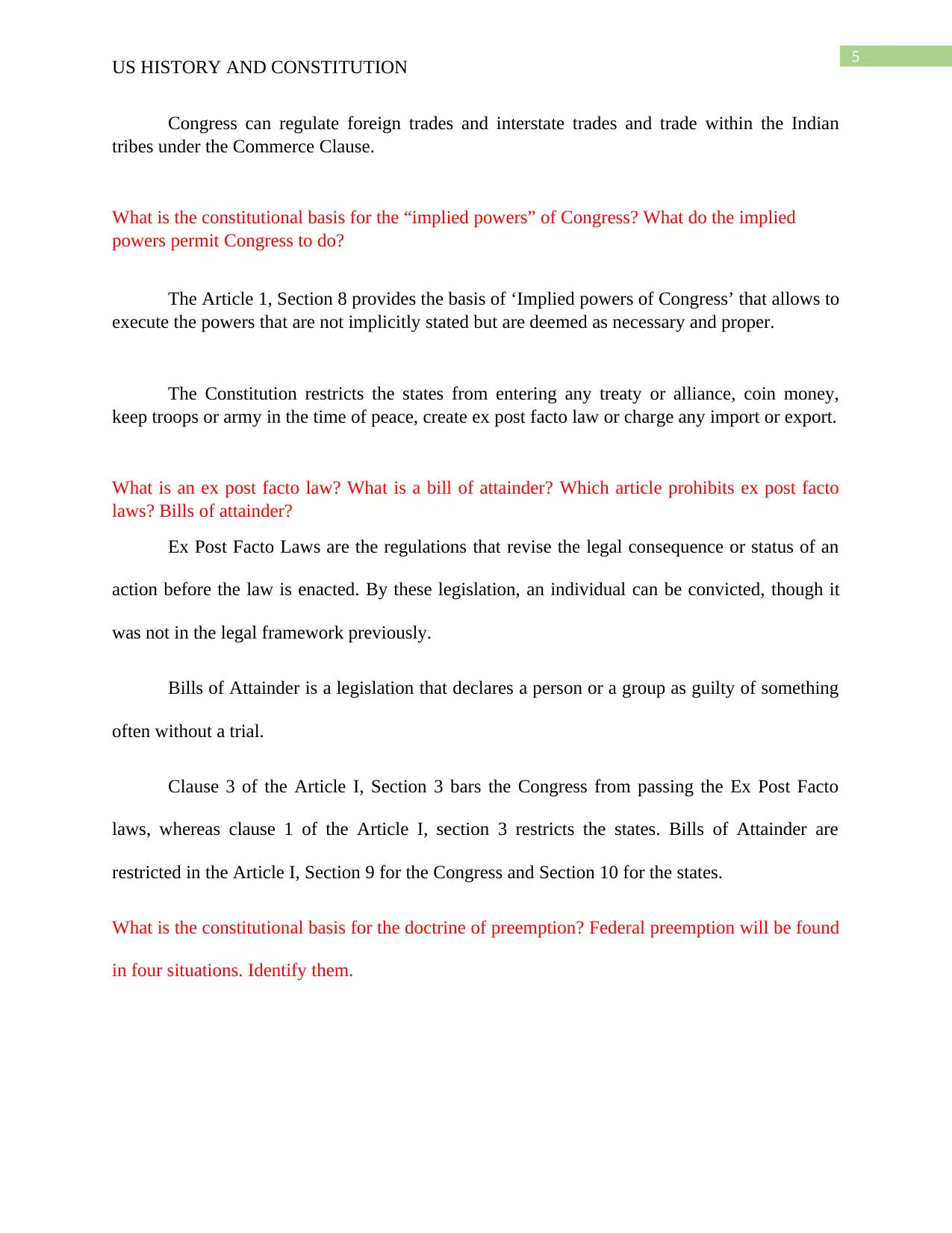
5
US HISTORY AND CONSTITUTION
Congress can regulate foreign trades and interstate trades and trade within the Indian
tribes under the Commerce Clause.
What is the constitutional basis for the “implied powers” of Congress? What do the implied
powers permit Congress to do?
The Article 1, Section 8 provides the basis of ‘Implied powers of Congress’ that allows to
execute the powers that are not implicitly stated but are deemed as necessary and proper.
The Constitution restricts the states from entering any treaty or alliance, coin money,
keep troops or army in the time of peace, create ex post facto law or charge any import or export.
What is an ex post facto law? What is a bill of attainder? Which article prohibits ex post facto
laws? Bills of attainder?
Ex Post Facto Laws are the regulations that revise the legal consequence or status of an
action before the law is enacted. By these legislation, an individual can be convicted, though it
was not in the legal framework previously.
Bills of Attainder is a legislation that declares a person or a group as guilty of something
often without a trial.
Clause 3 of the Article I, Section 3 bars the Congress from passing the Ex Post Facto
laws, whereas clause 1 of the Article I, section 3 restricts the states. Bills of Attainder are
restricted in the Article I, Section 9 for the Congress and Section 10 for the states.
What is the constitutional basis for the doctrine of preemption? Federal preemption will be found
in four situations. Identify them.
US HISTORY AND CONSTITUTION
Congress can regulate foreign trades and interstate trades and trade within the Indian
tribes under the Commerce Clause.
What is the constitutional basis for the “implied powers” of Congress? What do the implied
powers permit Congress to do?
The Article 1, Section 8 provides the basis of ‘Implied powers of Congress’ that allows to
execute the powers that are not implicitly stated but are deemed as necessary and proper.
The Constitution restricts the states from entering any treaty or alliance, coin money,
keep troops or army in the time of peace, create ex post facto law or charge any import or export.
What is an ex post facto law? What is a bill of attainder? Which article prohibits ex post facto
laws? Bills of attainder?
Ex Post Facto Laws are the regulations that revise the legal consequence or status of an
action before the law is enacted. By these legislation, an individual can be convicted, though it
was not in the legal framework previously.
Bills of Attainder is a legislation that declares a person or a group as guilty of something
often without a trial.
Clause 3 of the Article I, Section 3 bars the Congress from passing the Ex Post Facto
laws, whereas clause 1 of the Article I, section 3 restricts the states. Bills of Attainder are
restricted in the Article I, Section 9 for the Congress and Section 10 for the states.
What is the constitutional basis for the doctrine of preemption? Federal preemption will be found
in four situations. Identify them.
⊘ This is a preview!⊘
Do you want full access?
Subscribe today to unlock all pages.

Trusted by 1+ million students worldwide
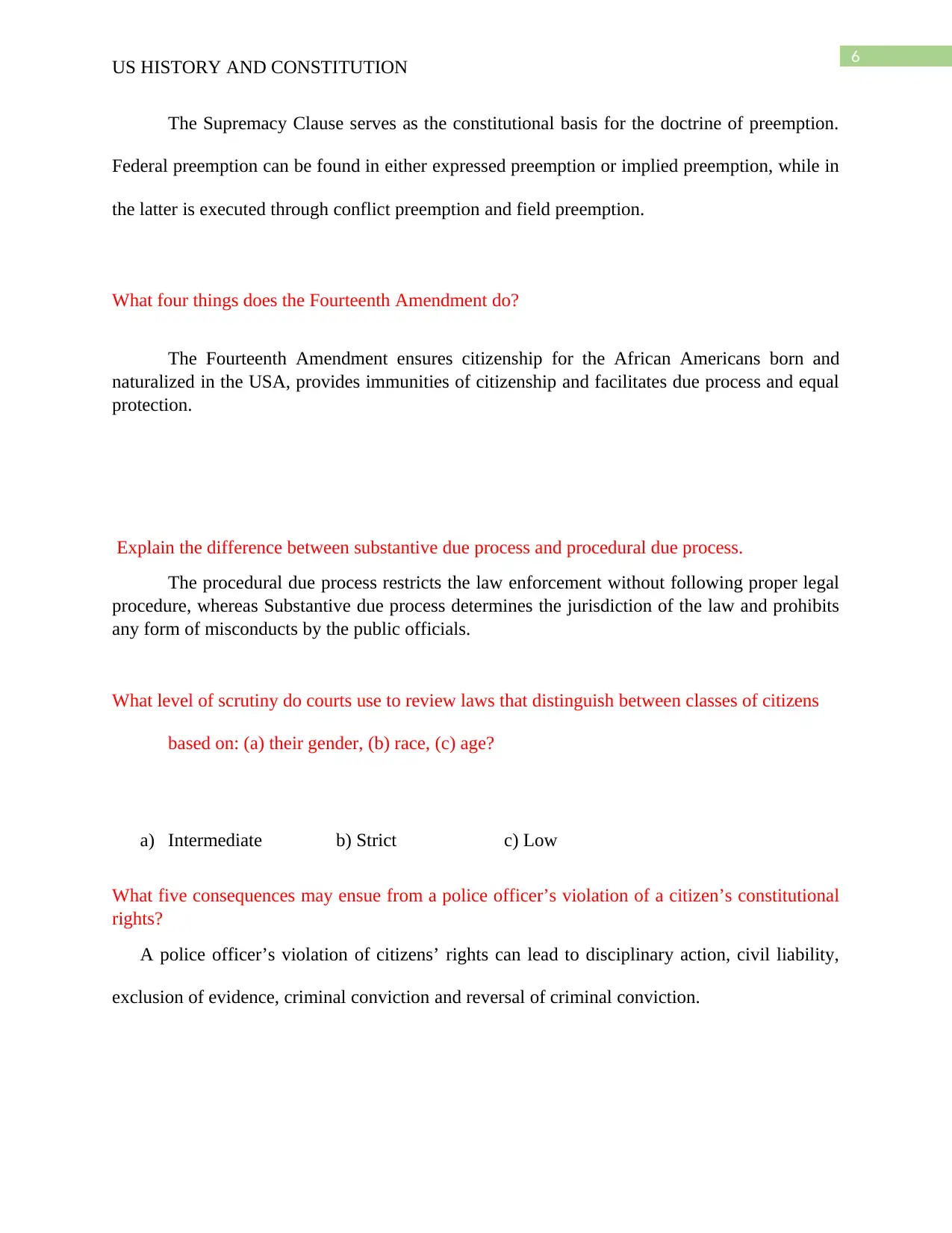
6
US HISTORY AND CONSTITUTION
The Supremacy Clause serves as the constitutional basis for the doctrine of preemption.
Federal preemption can be found in either expressed preemption or implied preemption, while in
the latter is executed through conflict preemption and field preemption.
What four things does the Fourteenth Amendment do?
The Fourteenth Amendment ensures citizenship for the African Americans born and
naturalized in the USA, provides immunities of citizenship and facilitates due process and equal
protection.
Explain the difference between substantive due process and procedural due process.
The procedural due process restricts the law enforcement without following proper legal
procedure, whereas Substantive due process determines the jurisdiction of the law and prohibits
any form of misconducts by the public officials.
What level of scrutiny do courts use to review laws that distinguish between classes of citizens
based on: (a) their gender, (b) race, (c) age?
a) Intermediate b) Strict c) Low
What five consequences may ensue from a police officer’s violation of a citizen’s constitutional
rights?
A police officer’s violation of citizens’ rights can lead to disciplinary action, civil liability,
exclusion of evidence, criminal conviction and reversal of criminal conviction.
US HISTORY AND CONSTITUTION
The Supremacy Clause serves as the constitutional basis for the doctrine of preemption.
Federal preemption can be found in either expressed preemption or implied preemption, while in
the latter is executed through conflict preemption and field preemption.
What four things does the Fourteenth Amendment do?
The Fourteenth Amendment ensures citizenship for the African Americans born and
naturalized in the USA, provides immunities of citizenship and facilitates due process and equal
protection.
Explain the difference between substantive due process and procedural due process.
The procedural due process restricts the law enforcement without following proper legal
procedure, whereas Substantive due process determines the jurisdiction of the law and prohibits
any form of misconducts by the public officials.
What level of scrutiny do courts use to review laws that distinguish between classes of citizens
based on: (a) their gender, (b) race, (c) age?
a) Intermediate b) Strict c) Low
What five consequences may ensue from a police officer’s violation of a citizen’s constitutional
rights?
A police officer’s violation of citizens’ rights can lead to disciplinary action, civil liability,
exclusion of evidence, criminal conviction and reversal of criminal conviction.
Paraphrase This Document
Need a fresh take? Get an instant paraphrase of this document with our AI Paraphraser
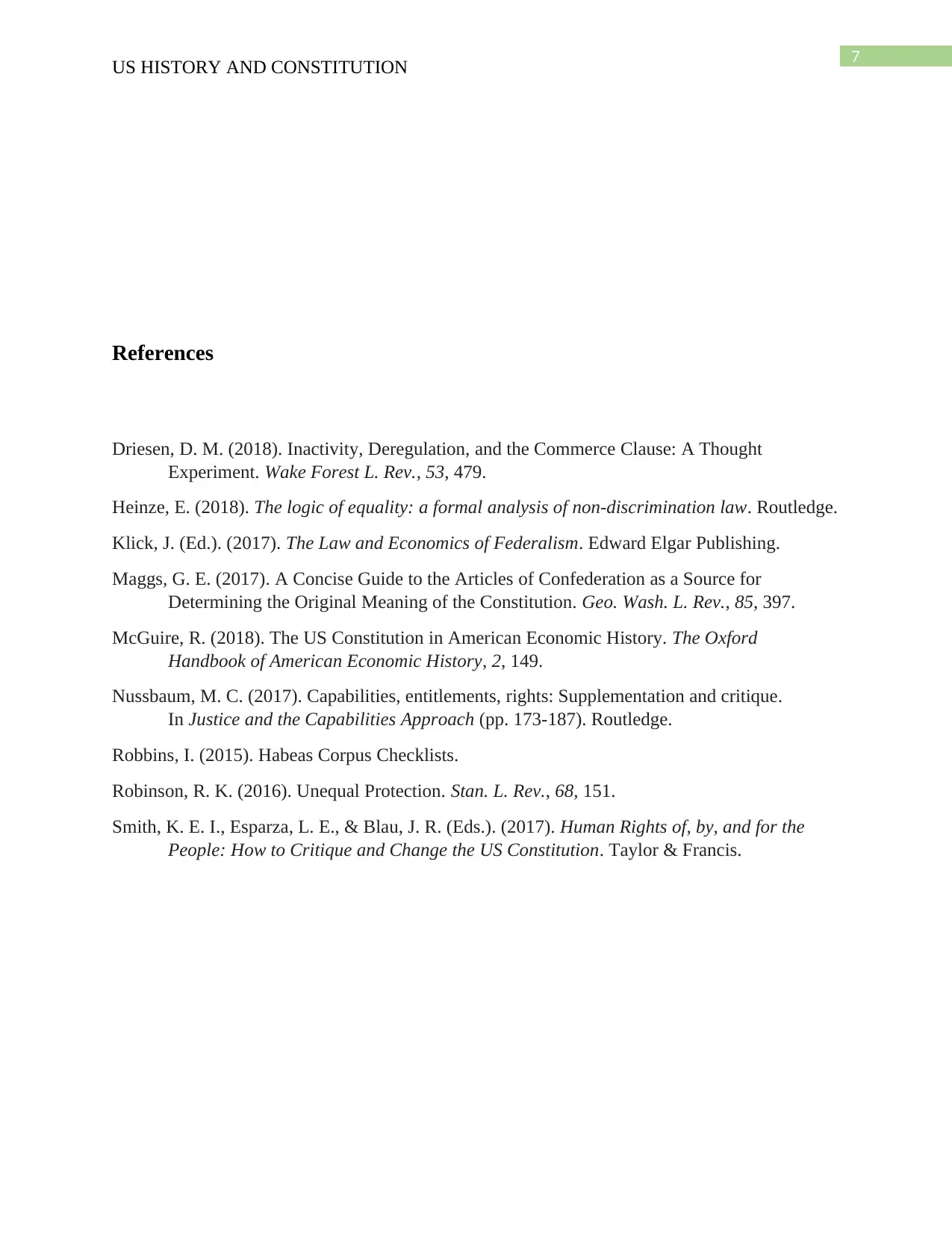
7
US HISTORY AND CONSTITUTION
References
Driesen, D. M. (2018). Inactivity, Deregulation, and the Commerce Clause: A Thought
Experiment. Wake Forest L. Rev., 53, 479.
Heinze, E. (2018). The logic of equality: a formal analysis of non-discrimination law. Routledge.
Klick, J. (Ed.). (2017). The Law and Economics of Federalism. Edward Elgar Publishing.
Maggs, G. E. (2017). A Concise Guide to the Articles of Confederation as a Source for
Determining the Original Meaning of the Constitution. Geo. Wash. L. Rev., 85, 397.
McGuire, R. (2018). The US Constitution in American Economic History. The Oxford
Handbook of American Economic History, 2, 149.
Nussbaum, M. C. (2017). Capabilities, entitlements, rights: Supplementation and critique.
In Justice and the Capabilities Approach (pp. 173-187). Routledge.
Robbins, I. (2015). Habeas Corpus Checklists.
Robinson, R. K. (2016). Unequal Protection. Stan. L. Rev., 68, 151.
Smith, K. E. I., Esparza, L. E., & Blau, J. R. (Eds.). (2017). Human Rights of, by, and for the
People: How to Critique and Change the US Constitution. Taylor & Francis.
US HISTORY AND CONSTITUTION
References
Driesen, D. M. (2018). Inactivity, Deregulation, and the Commerce Clause: A Thought
Experiment. Wake Forest L. Rev., 53, 479.
Heinze, E. (2018). The logic of equality: a formal analysis of non-discrimination law. Routledge.
Klick, J. (Ed.). (2017). The Law and Economics of Federalism. Edward Elgar Publishing.
Maggs, G. E. (2017). A Concise Guide to the Articles of Confederation as a Source for
Determining the Original Meaning of the Constitution. Geo. Wash. L. Rev., 85, 397.
McGuire, R. (2018). The US Constitution in American Economic History. The Oxford
Handbook of American Economic History, 2, 149.
Nussbaum, M. C. (2017). Capabilities, entitlements, rights: Supplementation and critique.
In Justice and the Capabilities Approach (pp. 173-187). Routledge.
Robbins, I. (2015). Habeas Corpus Checklists.
Robinson, R. K. (2016). Unequal Protection. Stan. L. Rev., 68, 151.
Smith, K. E. I., Esparza, L. E., & Blau, J. R. (Eds.). (2017). Human Rights of, by, and for the
People: How to Critique and Change the US Constitution. Taylor & Francis.
1 out of 8
Your All-in-One AI-Powered Toolkit for Academic Success.
+13062052269
info@desklib.com
Available 24*7 on WhatsApp / Email
![[object Object]](/_next/static/media/star-bottom.7253800d.svg)
Unlock your academic potential
Copyright © 2020–2026 A2Z Services. All Rights Reserved. Developed and managed by ZUCOL.
